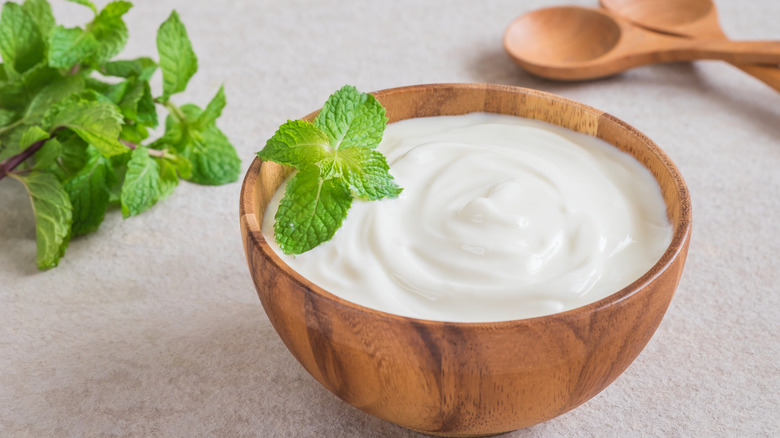Here's Why You Should Eat Yogurt Before Going To Sleep
Everyone has had a bad experience with a pre-bedtime snack before. Whether it's weird cheese dreams from eating too much brie, a sugar high from that piece of pie that makes it hard to sleep, or fatty foods that sit in a lump in your stomach as you try to shut down for the night, eating the wrong foods before hitting the hay can make falling, and staying, asleep difficult. However, there are some foods that, if you eat before bed, may actually help you get a good night's sleep, and plain yogurt is one of the best!
Health and wellness expert Edwina Clark explains, "A bowl of Greek yogurt and fruit provides all the creamy sweetness of ice cream without the added fat and sugar. And yogurt is rich in probiotics, which may help settle the stomach, and is also a source of the amino acid tryptophan, which helps regulate circadian rhythms" (via Food Network).
Many people are familiar with tryptophan as the enzyme in turkey that tends to inspire the need for a post-Thanksgiving meal nap. Wired writes that most high protein foods, including yogurt, contain significant amounts of tryptophan, which in turn helps your body produce serotonin and melatonin, two hormones that help with sleep regulation (via The International Journal of Tryptophan Research).
Improving your digestion might help you sleep better
A 2015 study by the Gastroenterology & Hepatology journal suggested that there's a correlation between gastrointestinal issues and problems sleeping. However, scientists have also studied the potential correlation between yogurt and improved gut health due to the probiotics it contains.
Probiotics are active live cultures of beneficial bacteria, including Lactobacillus and Streptococcus strains. As Harvard Women's Health Watch (HWHW) notes, the probiotics in yogurt tend to mimic the natural enzymes in your gut. The live cultures in yogurt contain lactic acid-producing bacteria (LAB) seem to help regulate digestion and alleviate symptoms of a wide variety of gastrointestinal diseases, according to a 2004 study reported in The American Journal of Clinical Nutrition.
The type of yogurt itself doesn't matter, HWHW continues, as long whatever you choose contains active/live cultures (which may not be written on the label), is high in protein, and contains as few added ingredients as possible. Greek yogurt tends to have more protein than other yogurts, but regular yogurt will do the trick.
There are ways to dress up plain yogurt without impacting your shut-eye
If plain yogurt is hard for you to swallow, you can add ingredients to make it more palatable. But stay away from pre-flavored, sweetened yogurts to avoid spikes in your blood sugar level, which The Sleep Foundation notes can disrupt your sleep. Instead, buy plain yogurt and then add fresh or frozen, unsweetened berries. The juice from thawed frozen berries adds both natural sweetness and bright berry colors.
For those that don't like the sometimes bitter tang of plain yogurt, consider adding natural-based artificial sweeteners like Stevia to up the sweetness. On the nights you're craving something more savory, Livestrong suggests you can make a tzatziki sauce by adding shredded, drained cucumbers, lemon, and salt to the yogurt. Eat it with a selection of crudités, like celery, carrots, bell peppers, cucumbers, or other vegetables that will give you the crunch without the calories, fat, or carbs.
And if you're tired of yogurt entirely, you can try kefir, which BBC Food compares to a drinkable yogurt. It's similarly full of probiotics and has other potential health benefits as well.


